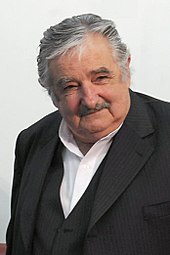Socialism
![]()
This article explains the political and social science term. For the journal of the same name, see Socialism (journal).
![]()
Socialist is a redirect to this article. For the magazine, see The Socialist; for the British intelligence operation, see Operation Socialist.
Socialism (from Latin socialis 'comradely') is one of the three major political ideologies that emerged in the 19th century, along with liberalism and conservatism. There is no clear definition of the term. It encompasses a wide range of political orientations. These range from (fighting) movements and parties that see themselves as revolutionary and want to overcome capitalism quickly and by force, to reformatory lines that accept parliamentarism and democracy (democratic socialism). Accordingly, there is also a rough differentiation between the orientations of communism, social democracy or anarchism. Socialists generally emphasize the basic values of equality, justice, solidarity and, in some currents, the realization of negative and positive freedom. They often emphasize the close interrelationship between practical social movements and theoretical social criticism, pursuing the goal of reconciling the two with a view to a socially just economic and social order.
Historically, systems have existed and continue to exist in many states which are referred to - partly as their own designation - as real socialism, but also as state socialism, and which can basically be classified as authoritarian or totalitarian systems; these include the Soviet Union, the People's Republic of China, North Korea, the GDR or Cuba.

May Day 1912 Socialist Demonstration in Union Square, New York City.
Term
Conceptual History
Socialistae (Latin) or socialisti (Italian) were the polemical names given in the 18th century to the representatives of modern natural law in the manner of Hugo Grotius and Samuel von Pufendorf by Roman Catholic theologians who were critical or even hostile to the Enlightenment. In 1762 Jean-Jacques Rousseau wrote his work Du contrat social, in which the state is based on the contract (contract) of free individuals. Since 1793, the legal-philosophical term "socialists" has been used in Germany for adherents of Pufendorf's principle of solidarity.
The word socialism is first found in 1803 in the Italian form socialismo. Giacomo Giuliani, in his critique of Rousseau, uses this term positively to refer to the social order, but in that he considered it to be the divine will that society be characterized by hierarchies between people. Such a religious reinterpretation, however, was strongly criticized because the term was seen as causally related to Enlightenment liberalism.
The first evidence of the use of the word socialist in English was found in 1824, the actual French socialisme first in 1832, coined by Joncières, more widely used by Leroux and Reybaud.
A transfer of the original adjective social into today's German social language is to be sought in the vicinity of common, just or socially reasonable, beneficial to the community.
The adjective socialist, on the other hand, was understood politically from the beginning. It is socially a further development of the social thoughts of the Enlightenment insofar as this equality is to be granted not only to the right but also to property.
Definition problem
What is meant by socialism has long been disputed. As early as the 1920s, the sociologist Werner Sombart collected 260 definitions of socialism.
A generally accepted, scientifically valid definition does not exist. Rather, the use of the term is characterized by a great variety of meanings and conceptual vagueness and is subject to constant change of meaning. For this reason, adjectives (proletarian, scientific, democratic, Christian, cooperative, conservative, utopian) are often prefixed to the term to make it more precise. Further examples of such specifications are, for example, agrarian socialism, state socialism or reform socialism.
A lowest common denominator of the term can be given by the following definitions:
"Socialism refers to a broad range of economic theories of social organization that have collective ownership and political administration as their goal in creating an egalitarian society."
"Socialism refers to ideologies that advocate the overcoming of capitalism and the liberation of the working class from poverty and oppression (social question) in favor of a social order oriented toward equality, solidarity, and emancipation."
"It xdefined as a political doctrine developed as a counter-model to capitalism that seeks to change existing social conditions with the goal of social equality and justice, and a social order organized according to these principles, as well as a political movement that strives for this social order."
The variety of meanings is further increased by the fact that the term socialism can denote methods and objectives, socio-political movements as well as historical-social phases and existing social systems:
- a socio-economic, political, philosophical, pedagogical or ethical doctrine directed towards the interpretation, analysis, criticism, ideal or practical shaping of certain social conditions;
- a political movement which tries to realize in practice the demands and aims founded by socialism;
- the state of society or social order which embodies socialism in economic modes of production and forms of life;
- within the framework of Marxism-Leninism, a world-historical phase of development in the transition from capitalist to communist social formation.
- the term "real socialism", which was used to describe those states that had been ruled by a Communist Party, usually in a one-party system, since 1917.
According to the political scientist Günter Rieger, socialist ideologies can be distinguished firstly according to their attitude to the state (state socialism versus anarchism), secondly according to the way in which the desired transformation of society is to be achieved (revolution versus reform), and thirdly according to the importance given to different social and economic interests of those involved (class antagonism versus pluralism).
Perspectives
An academic debate on socialism as an alternative conception of society, such as took place at universities during the German student movement of the 1960s, hardly takes place today. Only individual social scientists such as Wolfgang Fritz Haug, in view of the alleged turbo-capitalism today and the lifestyles associated with it, call for learning from historical experience and updating the socialist project. A critical stocktaking is undertaken, among others, by the journal Das Argument and the edition of the Historical-Critical Dictionary of Marxism (HKWM), which is also based there. A future alternative way of life with socialism is also being discussed in the environment of the Rosa Luxemburg Foundation, which belongs to the party Die Linke.
In his paper The Idea of Socialism, the social philosopher Axel Honneth presented a critique of the original idea of socialism rooted in the Industrial Revolution and redefined "social freedom" as its core idea. Today, socialism means experimental political anchoring on the way to a society based on solidarity, which is to be striven for not only on the economic but also on the political level and in personal relations (especially between the sexes).
The political sociologist Heinz Dieterich also presents a new interpretation with his concept of 21st century socialism, in which he attempts to link Marxist value theory with grassroots democratic elements, which is then based on a non-market economy of equivalence democratically determined by those who directly create value. Attempts to put this new theory into practice can currently be found in Venezuela (Bolivarism) and Bolivia. The theory of a democratic confederalism is currently being tried to be realised in various Kurdish organisations and local administrations of a socialist character (Rojava, YPG).
Wolfram Elsner, Professor of Economics at the University of Bremen, sees Chinese-style socialism as a "more effective model" "compared to the old, Euro-centric concept of socialism", but also compared to "neoliberal financial market capitalism". In his 2020 book The Chinese Century, he writes: "China today is capable of breaking down again the decades-long discrediting and tabooing of any idea of real socialism, especially because it shows that socialism in the 21st century is no longer a static, bureaucratic poverty system, but can even surpass real existing capitalism in this respect and expand human perspectives."

José Mujica (* 1935) was president of Uruguay 2010-2015 and represented socialist positions
Questions and Answers
Q: What is socialism?
A: Socialism is an economic and political system where the workers or the government own the buildings and tools that make goods and services like farms and factories.
Q: How can socialism be achieved?
A: Socialism can be achieved through decentralized and direct worker-ownership, or through centralized state-ownership of the means of production.
Q: How is socialism different from capitalism?
A: Socialism is different from capitalism as the means of production are privately owned by capital holders in capitalism, whereas in socialism, they are owned by the government or the workers.
Q: What is the difference between socialism and communism?
A: While all communism is socialism, not all socialism is communism. Socialism is an economic and political system where the workers or the government own the means of production whereas communism advocates for a classless society where all property and resources are collectively owned by and shared among the citizens.
Q: Can socialism be achieved through both worker-ownership and state-ownership?
A: Yes, socialism can be achieved through both decentralized and direct worker-ownership, or through centralized state-ownership of the means of production.
Q: What does socialism seek to achieve?
A: Socialism seeks to promote social and economic equality for all members of society, rather than profit for the capitalist class.
Q: What are the Forms of socialism?
A: socialism can take the form of democratic socialism, market socialism, social democracy, libertarian socialism, or revolutionary socialism, among other forms.
Search within the encyclopedia